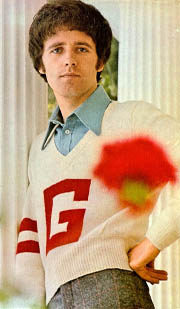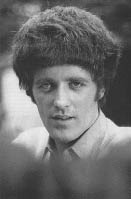The famous singer Gilbert O'Sullivan was born on 1 December 1946,
in Waterford city and was christened Raymond O'Sullivan. A few short
years after Raymond was born the family moved to a new housing estate
that had just been built (1946/48) on the Cork Road in Waterford where
Raymond made a life-long friend, Peter Roche, now a quantity surveyor in
Waterford. Raymond's father died while he was still very young and
the family
moved to Swindon, England although family relations still live in, and
around, Waterford. After attending art
college, the singer was signed to CBS Records. Under the name
Gilbert he issued the unsuccessful 'What Can I Do?' and soon moved on to
Phil Solomon's Major Minor
 label,
where 'Mr. Moody's Garden' also failed. Seeking a new manager, Gilbert
wrote to the star-making Gordon Mills, who had already launched Tom Jones
and Engelbert Humperdinck to international success. Mills was impressed
by the demo tape enclosed and re-launched the artist on his new MAM label
under the name Gilbert O'Sullivan. The debut 'Nothing Rhymed' had some
clever lyrics and a strong melody. It reached the UK Top 10 in late 1970
and television audiences were amused, or puzzled, by the sight of
O'Sullivan with his pudding basin haircut, short trousers and flat cap. The 'Bisto Kid' image was retained for the first few releases and the
singer initially acted the part of an anti-star. At one point, he was
living in the grounds of Mills' Weybridge house on a meagre £10 a week
allowance. His hit-making potential was undeniable and his ability to
pen a memorable melody recalled the urbane charm of Paul McCartney. Early UK successes included 'We Will', 'No Matter How I Try' and the
major international hit, 'Alone
Again (Naturally)'. Any suspicions that O'Sullivan's charm was largely
parochial were dashed when the latter single broke through in America,
peaking at number one and
selling over a million copies. The debut album, 'Himself' was also highly
accomplished and included the radio favourite 'Matrimony', which would
have provided a sizeable hit if released as a single. O'Sullivan went on
to become one of the biggest selling artists of 1972. That year he
enjoyed two consecutive UK number one hits with 'Clair' (written in honour of Mills’s daughter) and 'Get Down'. These singles also reached the US
Top 10. By this time, O'Sullivan's image had radically changed and he
began to appreciate the superstar trappings enjoyed by Mills' other
acts. label,
where 'Mr. Moody's Garden' also failed. Seeking a new manager, Gilbert
wrote to the star-making Gordon Mills, who had already launched Tom Jones
and Engelbert Humperdinck to international success. Mills was impressed
by the demo tape enclosed and re-launched the artist on his new MAM label
under the name Gilbert O'Sullivan. The debut 'Nothing Rhymed' had some
clever lyrics and a strong melody. It reached the UK Top 10 in late 1970
and television audiences were amused, or puzzled, by the sight of
O'Sullivan with his pudding basin haircut, short trousers and flat cap. The 'Bisto Kid' image was retained for the first few releases and the
singer initially acted the part of an anti-star. At one point, he was
living in the grounds of Mills' Weybridge house on a meagre £10 a week
allowance. His hit-making potential was undeniable and his ability to
pen a memorable melody recalled the urbane charm of Paul McCartney. Early UK successes included 'We Will', 'No Matter How I Try' and the
major international hit, 'Alone
Again (Naturally)'. Any suspicions that O'Sullivan's charm was largely
parochial were dashed when the latter single broke through in America,
peaking at number one and
selling over a million copies. The debut album, 'Himself' was also highly
accomplished and included the radio favourite 'Matrimony', which would
have provided a sizeable hit if released as a single. O'Sullivan went on
to become one of the biggest selling artists of 1972. That year he
enjoyed two consecutive UK number one hits with 'Clair' (written in honour of Mills’s daughter) and 'Get Down'. These singles also reached the US
Top 10. By this time, O'Sullivan's image had radically changed and he
began to appreciate the superstar trappings enjoyed by Mills' other
acts.
O'Sullivan's second album, Back
To Front, reached number 1 in the UK and his appeal
 stretched
across the board, embracing teen and adult audiences. For a time, he
seemed likely to rival, and even excel, Elton John as Britain's most
successful singer/songwriter export. Although further hits were
forthcoming with 'Ooh Baby', 'Happiness Is You And Me' and 'Christmas
Song', it was evident that his appeal had declined by the mid-70s.
Following the UK Top 20 hit 'I Don't Love You But I Think I Like You' in
the summer of 1975, his chart career ceased. After a spectacular falling
out with Mills, he left MAM and returned to CBS, the label that had
launched his career. Five years on, only one hit, 'What's In A Kiss?',
emerged from the association. Minus Mills, it seemed that the superstar
of the mid-70s was incapable of rekindling his once illustrious career. His disillusionment culminated in a High Court battle against his former
manager and record company which came before justice Mars Jones in the
spring of 1982. The judge not only awarded O'Sullivan substantial
damages and had all agreements with MAM set aside, but decreed that all
the singer's master tapes and copyrights should be returned. The case
made legal history and had enormous repercussions for the British music
publishing world. Despite his court victory over the star-making Mills,
however, O'Sullivan failed, subsequently, to re-establish his career. stretched
across the board, embracing teen and adult audiences. For a time, he
seemed likely to rival, and even excel, Elton John as Britain's most
successful singer/songwriter export. Although further hits were
forthcoming with 'Ooh Baby', 'Happiness Is You And Me' and 'Christmas
Song', it was evident that his appeal had declined by the mid-70s.
Following the UK Top 20 hit 'I Don't Love You But I Think I Like You' in
the summer of 1975, his chart career ceased. After a spectacular falling
out with Mills, he left MAM and returned to CBS, the label that had
launched his career. Five years on, only one hit, 'What's In A Kiss?',
emerged from the association. Minus Mills, it seemed that the superstar
of the mid-70s was incapable of rekindling his once illustrious career. His disillusionment culminated in a High Court battle against his former
manager and record company which came before justice Mars Jones in the
spring of 1982. The judge not only awarded O'Sullivan substantial
damages and had all agreements with MAM set aside, but decreed that all
the singer's master tapes and copyrights should be returned. The case
made legal history and had enormous repercussions for the British music
publishing world. Despite his court victory over the star-making Mills,
however, O'Sullivan failed, subsequently, to re-establish his career.
Albums: Himself (1971), Back To
Front (1972), I'm A Writer Not A Fighter (1973), Stranger In My Own
Backyard (1974), Southpaw (1977), Off Centre (1980), Life And Rhymes
(1982), Frobisher Drive (1988), In the Key of G (1989), Live in Japan
(1993), By Larry (1994), Every Song Has It's Play (1995), Singer Sawing
Machine (1997).
Compilations: Greatest Hits
(1976), 20 Golden Greats (1981), 20 Of The Very Best (1981), 20 Golden
Pieces Of Gilbert O'Sullivan (1985), 16 Golden Classics (1986).
|